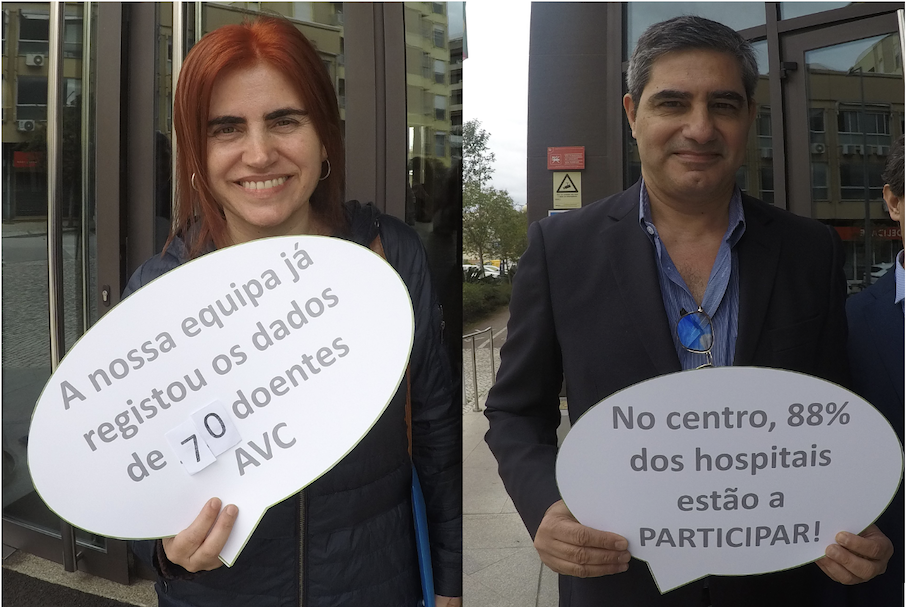
VISUALIZADAS num mapa, estas cidades formam um triângulo perfeito – Coimbra a oeste, Tondela a norte e Castelo Branco a leste. Aproximadamente no interior do triângulo encontra-se a região do Centro de Portugal, um local de beleza acidentada, história rica – e ultimamente também prometer, pois é aqui que o programa de monitorização da qualidade da comunidade portuguesa de AVC está a ganhar a tração de que precisa para ter sucesso.
O programa revisto requer que os hospitais enviem dados de doentes de AVC para o RES-Q ou SITS-QR para qualquer mês completo por semestre. Quando o programa foi lançado pela primeira vez em 2021, março e novembro foram designados meses de recolha de dados, mas espera-se que uma abordagem mais flexível ajude a ultrapassar barreiras à recolha consistente de dados.
Na região Centro, esta flexibilidade foi tratada como uma oportunidade para enviar dados mais cedo do que mais tarde. De facto, todos os hospitais que tratam AVC na região enviaram dados de doentes para janeiro de 2023, agindo de forma decisiva e em uníssono para melhorar os cuidados de AVC na região e estabelecendo uma referência para hospitais noutras partes do país.
A inspiração para este feito extraordinário pode ser encontrada no mesmo mapa, onde um pouco de imaginação lhe permite ver dois pontos brilhantes – um a oeste, onde o Dr. Gustavo Santo é neurologista no Centro Hospitalar e Universitário de Coimbra (CHUC) e o coordenador regional do código de AVC do Centro, e outro a norte, onde a Dra. Ana Gomes é a coordenadora da unidade de AVC no Centro Hospitalar de Tondela-Viseu, bem como a coordenadora do RES-Q de Portugal.
Com 19 Prémios ESO Angels ganhos desde 2018, incluindo 10 prémios de diamante, o Hospital Tondela-Viseu é um exemplo brilhante do impacto da monitorização da qualidade nos cuidados de AVC. O Dr. Gomes explica: “A monitorização da qualidade permite-nos avaliar os nossos indicadores, reconhecer os nossos “pontos fracos” e corrigir o nosso desempenho. E quando atingimos determinados objetivos de qualidade, isso motiva a equipa.”
O Dr. Gomes está otimista sobre o potencial impacto da iniciativa Melhora Quem Sabe nos cuidados de AVC em Portugal. “Os dados concretos irão trazer a ligeiras disparidades entre hospitais e os problemas que afetam a qualidade dos cuidados de AVC, mas este impacto depende muito da participação. Cargas de trabalho espantosas e suporte de gestão insuficiente para monitorização da qualidade desencorajam os hospitais de registar pacientes. No nosso hospital também, a carga de trabalho pesada e o grande volume de doentes por vezes impossibilitaram-me de registar os doentes de forma consistente, algo que superámos ao tornar os colegas de equipa co-responsáveis pela recolha de dados.”
O Dr. Gomes acredita que ser capaz de escolher um mês para a recolha de dados irá ajudar a trazer mais unidades de AVC a bordo.

A 50 minutos de carro de Tondela, em Coimbra, o Dr. Gustavo Santo não deixa nada ao acaso. O Centro Hospitalar e Universitário de Coimbra é o hospital de referência da região para trombectomia e centro de telemedicina, e o Dr. Santo assumiu um papel ativo na reunião da participação dos hospitais do Centro na iniciativa Melhora Quem Sabe.
“Contactou todos os hospitais da região e incentivou-os a enviar os seus dados”, afirma Inês Carvalho, consultor Angels para Portugal. O estilo de incentivo presumivelmente vigoroso do Dr. Santo desencadeou a ambição de todos os hospitais na rede, preparando o terreno para a melhoria orientada por dados na região.
O Dr. Santo faz o seu próprio contributo, dizendo que participou apenas com muitos outros profissionais de cuidados de saúde na obtenção de hospitais na rede regional para partilhar os seus dados para janeiro de 2023. Mas Inês marca o recorde: “Foi possível porque ele insistiu”.
O Dr. Santos é, tal como o Dr. Gomes, um defensor da monitorização da qualidade, acreditando que deveria ter um “papel central no design das organizações”.
“Permite-lhe examinar rigorosamente os pontos de falha na cadeia de cuidados e implementar medidas corretivas. Não podemos corrigir o que é desconhecido.”
O Dr. Santo afirma que os hospitais na rede têm sido geralmente responsivos, apesar das pressões da escassez de recursos humanos e da elevada rotatividade de pessoal durante um período desafiante no serviço nacional de saúde.
“Os méritos da monitorização da qualidade são evidentes,” afirma ele. “A parte mais difícil é combinar a vontade de medir, registar e avaliar com os meios para o fazer.”
Em Castelo Branco, no terceiro ponto do triângulo, a Dra Eugénia André e a Dra Raquel David encontraram a vontade e os meios. O Hospital Castelo Branco ainda não é um centro de AVC premiado, mas o seu compromisso recém-mintado para com a monitorização da qualidade e o entusiasmo da equipa por fazer parceria com a Angels diferencia-o como um futuro ponto brilhante nos cuidados de AVC.
O Dr. David enumera os motivos que os convenceram a participar na iniciativa de recolha de dados: “Consciência de como os atrasos no tratamento afetam a sobrevida e qualidade de vida do doente; o desejo de saber mais sobre o nosso desempenho atual; a oportunidade de aprender com os nossos pares partilhando informações e o apoio da Angels.”
Aqui, como em qualquer outro lugar, é o trabalho em equipa que supera os desafios da escassez de pessoal e da consequente falta de tempo. “A nossa estratégia tem sido distribuir tarefas e ter um sistema bem organizado para a recolha de dados, para que os membros da equipa possam entrar no lugar uns dos outros quando necessário,” afirma. Os enfermeiros compilam as informações numa base de dados a partir da qual são posteriormente exportadas para a plataforma RES-Q.
Envolver enfermeiros na recolha de dados é muito importante, diz o Dr. Santo. “Desempenham um papel decisivo nos cuidados que afeta vários indicadores de qualidade.”
Para hospitais noutras regiões que ainda não enviaram os seus dados para o primeiro semestre de 2023, o Dr. Gomes tem o seguinte aconselhamento: “Reúna a sua equipa para os informar do projeto, escolha um dos registos (RES-Q ou SITS-QR), selecione um mês e participe recolhendo dados para todos os doentes com AVC.”
O conselho do Dr. Santo é ainda mais suculento: “Só melhora quem sabe!”
Só pode melhorar se souber.


